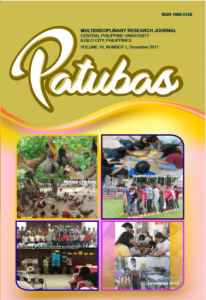Patubas Volume 16 No. 1 2017

Patubas is published once a year under the auspices of Central Philippine University, Jaro, Iloilo City, Philippines.
Copyright © 2017 by individual authors and Patubas.
Published in 2017
Central Philippine University
Lopez Jaena, St., Jaro, Iloilo City
All rights reserved. No part of this publication may be reproduced or transmitted in any form or by any means, electronic or mechanical, including photocopy, recording or any information storage and retrieval system, without permission in writing from the authors or publisher.
For Print ISSN 1908-515X
Publication ISSN 2672-3611
Opinions and facts contained in the articles published in this issue of Patubas are the sole responsibility of the individual authors and not of the Editorial Board, Patubas or Central Philippine University.
Jet R. Nillos, Evelyn R. Ybarzabal, Emma T. Gico, Bernie C. Cangrejo
and Mizpah C. Villalobos
ABSTRACT
The lemongrass kalamansi-ginger ready-to-drink (LGKG RTD)
beverage was previously developed to provide a healthy yet
convenient alternative to beverage products sold in canteens. This
study aims to determine the commercialization of the CPU LGKG
RTD beverage in terms of consumer preference, acceptability,
competitor analyses, and marketing strategy. The LGKG beverage
product was most preferred in the Elementary Canteen and Dining
Hall against two other competitor products. The product was
acceptable to 472 of 500 respondents, 457 indicated a willingness
to buy the product, and 435 preferred the price at P15-20. Test
marketing of the product showed the lowest sales at P50 selling
price, which was increased when the price was reduced. The RTD
beverage product is not saleable.
Reynalddo N. Dusaran and Manuel C. Palada
ABSTRACT
This study was conducted to establish baseline information for
organic agriculture practitioners in Region VI. Specifically, the
study aimed to A) identify the organic agriculture stakeholders in
Panay and Guimaras; B) classify the stakeholders according to the
following categories: 1) Advocates, 2) Practitioners, a) Input
producers (specify), b) Organic crop/animal/special products
producer/farmer, c) Organic products processors, d) Financiers, e)
Organic products/inputs trader, f) Technology providers/developer;
C) describe the personal and household profile of organic
agriculture stakeholders in Panay and Guimaras; D) describe the
farm profile and farming practices of organic agriculture
practitioners in Panay and Guimaras;
E) describe the marketing practices of organic crops and livestock
practitioners in Panay and Guimaras; F) determine the
accreditation status of the organic agriculture practitioner in Panay
and Guimaras; and, G) determine the problems in organic farming
encountered by the organic agriculture practitioners in Panay and
Guimaras, their suggestions and recommendations to promote
organic agriculture.
The study is purely descriptive and used the one-shot
survey design. Data were gathered from 3,626 identified organic
agriculture practitioners in the Panay and Guimaras using an
instrument developed for this study. Complete enumeration of the
organic agriculture practitioners was conducted through the
assistance of the Department of Agriculture RFU 6, Provincial
Agriculture Offices and Municipal/City Agriculture Offices. The
interviewers were organized from the different provinces with the
assistance of their respective Provincial Focal Persons for Organic Agriculture. Data processing and generation of tables was done at
the University Research Center of Central Philippine University by
using Statistical Package for Social Sciences (SPSS) Version 17.
Since this is a purely descriptive study, frequency distribution
tables and means were the main statistical tools used which
likewise served as the basis for analysis and interpretation of data.
Margen A. Java, Alfred C. Morales and Albert Jan Matthew A. Java
ABSTRACT
This descriptive-relational study was conducted to determine the
awareness of and attitudes towards leadership training seminar offered
by the university and the perceived influence of this training in the lives
of student-leaders. This made use of one-shot survey design augmented
by qualitative data gathered through Focus Group Discussion. The
respondents were the 165 student-leaders of Central Philippine
University who had attended the Leadership Training Seminar conducted
by the Student Development and Programs for the last three years (2013
– 2015). Data collected were processed and analyzed using Statistical
Package for Social Sciences (SPSS) for Windows (Windows 10.0
version). Based on the findings of the study, the following conclusions
are drawn: most of the respondents are females, aged 21 years old and
older, belong to the Colleges of Arts and Sciences; Education; and
Nursing and Allied Health Sciences; graduates of public high schools
and living with their parents or staying in boarding houses; are affiliated
with academic organizations; are officers of their organizations; attended
the 2014 and 2013 Leadership Training Seminar (LTS); and were
involved in both academic and non-academic organizations during their
high school days; had no previous knowledge about it; are aware that the
OSA/SDP/OSS/ Scholarship Office is the office in charge of the activity;
are aware that key officers of their organization should attend; and
believed that this activity is meant to enhance their leadership skills as
student-leaders. The respondents have either moderate or high awareness
of the LTS and have a very favorable attitude towards the LTS. The sex
of the respondents has a bearing on the perceived influence of LTS in
their lives. As for the overall influence of the LTS, the respondents felt
that they became improved leaders; disciplined and better persons now
serving without expecting a return and now have a heart to serve and
trust God.
Mary ‘O T. Penetrante, Dimpna C. Castigador, Levi O. De los Santos, Jr.,
Rezia Duerme, Joel H. Somosierra and Leofel J. Diamante
ABSTRACT
The United States Agency for International Development
(USAID) through its Strengthening Urban Resilience for Growth
with Equity (SURGE) Project has been providing direct technical
assistance to six selected cities under the Cities Development
Initiative (CDI) program. Three of these are the cities of Puerto
Princesa, Tagbilaran, and Zamboanga which are in the second
batch of the CDI.
Building on the business permitting reforms started by
another USAID-funded project- Investment Enabling Environment
(INVEST) from 2011 to 2014 in the first three CDI cities namely
Batangas, Iloilo, and Cagayan de Oro, SURGE will provide
assistance in helping the three cities move towards a fullyautomated
BPLS and Building and Occupancy Permits system. In
the second batch of CDI cities (Puerto Princesa, Tagbilaran, and
Zamboanga), the project will help the cities streamline their
business permitting processes, construction permitting and set up
of Business One-Stop Shops.
In the first quarter of 2016, as part of the diagnostic phase
in reducing the cost of doing business, the Project assessed the
business permit renewal processes, inspection systems and the
Business One Stop Shops (BOSS) of its six partner cities,
representing the first phase of its city-level engagement.
In the second quarter, this benchmarking activity was
identified following the experiences of the previously-assisted CDI
cities of Batangas, Iloilo and Cagayan de Oro that a direct
exposure through a study tour to other cities with reformed
business permitting systems will be relevant, useful and inspiring
for the assisted cities. Following the study tour, BPLS workshops
were conducted in the six CDI partner cities.
This report addresses Task 2.2.2 Streamline business
facility construction permitting process, Output 2.2.1.1.3
Workshop/Training/Study Tours on BPLS Streamlining and BPOS
Automation.
